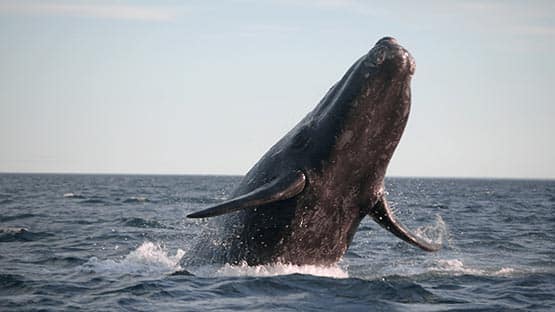
A new analysis from Oceana finds that hundreds of boats were speeding through both mandatory and voluntary slow zones designed to protect critically endangered North Atlantic right whales in the Virginia Beach area in the weeks prior to a deadly boat strike.
On Feb. 12, a 20-year-old male North Atlantic right whale was found dead off Virginia Beach.
The National Oceanic and Atmospheric Administration classified the blunt-force traumatic injuries as the cause of death and consistent with those of a boat strike.
Using Ship Speed Watch, a tool to monitor ship speeds in slow zones, Oceana documented that during the period of Feb. 1-11:
- More than 200 boats larger than 65 feet long traveled through slow zones established by NOAA at the mouth of Chesapeake Bay.
- Nearly 7 out of 10 boats (158 boats) traveled above the speed limit of 10 knots (11.5 mph) through either mandatory or voluntary slow zones.
- One boat traveled as fast as 23.2 knots (26.7 mph) — more than double the speed limit — within a designated mandatory slow zone.
- Around half of the boats (106 boats) were found speeding in the mandatory slow zones.
- 75 percent of boats (77 boats) did not comply with the mandatory or voluntary speed limits between Feb. 8-11
“Speeding boats and slow swimming whales are a recipe for disaster but a preventable one. Current vessel speed limits are ineffective and made worse by the fact that they aren’t even properly enforced,” said Gib Brogan, a campaign director at Oceana. “NOAA knows this and has a pending new regulation that would update the slow zones established to protect the North Atlantic right whale. NOAA must immediately issue the final vessel speed measures before more whales needlessly die.”
Brogan said the speed limits need enforcement and accountability for those breaking the law.
Vessel strikes are one of the biggest threats to the survival of the North Atlantic right whale. Last year, NOAA proposed new vessel speed regulations to address this ongoing threat to protect North Atlantic right whales. Nearly 20,000 Oceana members and supporters commented on the proposed rule that is currently under review. The final safeguards are not expected until later this year.
There are only around 340 of these critically endangered whales left in the world, including around 80 breeding females, according to Oceana.
Multiple studies show that slowing boats to 10 knots reduces a North Atlantic right whale’s risk of death by boat collision by 80 to 90 percent.
“I wish we could say that the death of this North Atlantic right whale was a rarity and a fluke, but we predicted this would happen and it did – on NOAA’s watch,” Brogan said. “Oceana sounded the alarm for months, calling on NOAA to protect these critically endangered whales from boat strikes as they traversed the East Coast during calving season. It is beyond frustrating and sad that any North Atlantic right whale had to die because of government inaction. Meanwhile, we continue to wait for our government to finalize its own proposal at a pace that feels like watching paint dry.”
Related stories
Oceana asks government to protect right whales as they migrate to warmer coastal areas
Coalition hires counsel to protect endangered right whale from offshore Virginia wind project










